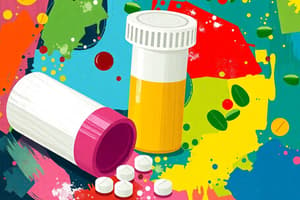Podcast
Questions and Answers
What is the primary goal of clinical decision making in nursing?
What is the primary goal of clinical decision making in nursing?
- Minimizing communication with other healthcare professionals
- Ensuring adherence to hospital protocols
- Anticipating and organizing patient problems to meet goals (correct)
- Maximizing the number of patients treated per shift
Which of the following is not considered one of the Five Rights of medication administration?
Which of the following is not considered one of the Five Rights of medication administration?
- Right documentation
- Right feedback (correct)
- Right dose
- Right patient
How does a culture of safety relate to medication administration?
How does a culture of safety relate to medication administration?
- It emphasizes minimizing risk through effective performance. (correct)
- It aims to eliminate all medication errors completely.
- It promotes faster medication delivery to patients.
- It focuses solely on individual nurse accountability.
What does patient education in drug therapy aim to achieve?
What does patient education in drug therapy aim to achieve?
What additional responsibility does a nurse have beyond the correct administration of medication?
What additional responsibility does a nurse have beyond the correct administration of medication?
What is the primary responsibility of the nurse regarding patient medications?
What is the primary responsibility of the nurse regarding patient medications?
What must a nurse be aware of to minimize adverse effects of medications?
What must a nurse be aware of to minimize adverse effects of medications?
Which of the following statements is true regarding a nurse's legal and ethical obligations?
Which of the following statements is true regarding a nurse's legal and ethical obligations?
In making PRN (as needed) medication decisions, what is most essential for a nurse to know?
In making PRN (as needed) medication decisions, what is most essential for a nurse to know?
What aspect of the patient's health history is crucial for medication management?
What aspect of the patient's health history is crucial for medication management?
When assessing a patient's medication needs, what is an important factor for the nurse?
When assessing a patient's medication needs, what is an important factor for the nurse?
Which of the following actions is part of the nurse's role in monitoring drug responses?
Which of the following actions is part of the nurse's role in monitoring drug responses?
What should a nurse recommend to a patient regarding over-the-counter (OTC) medications?
What should a nurse recommend to a patient regarding over-the-counter (OTC) medications?
What is the primary purpose of knowing the prescriber’s name and contact information?
What is the primary purpose of knowing the prescriber’s name and contact information?
Which of the following best describes the expected therapeutic response for atenolol (Beta Blocker)?
Which of the following best describes the expected therapeutic response for atenolol (Beta Blocker)?
When should a patient be instructed to check for symptoms of major adverse effects?
When should a patient be instructed to check for symptoms of major adverse effects?
What is a critical step the nurse should take before administering atenolol?
What is a critical step the nurse should take before administering atenolol?
What should a patient do if they miss a dose of their medication?
What should a patient do if they miss a dose of their medication?
What is a recommended storage method for medications requiring specific conditions?
What is a recommended storage method for medications requiring specific conditions?
Which of the following statements about drug-drug interactions is true?
Which of the following statements about drug-drug interactions is true?
What is considered an appropriate method of administering medication in a patient-centered approach?
What is considered an appropriate method of administering medication in a patient-centered approach?
Which of the following is NOT a high-risk factor for patients receiving medication?
Which of the following is NOT a high-risk factor for patients receiving medication?
Which nursing diagnosis would be most relevant for a patient with a previously identified drug allergy?
Which nursing diagnosis would be most relevant for a patient with a previously identified drug allergy?
What is an important intervention for minimizing adverse effects of medications?
What is an important intervention for minimizing adverse effects of medications?
When administering medication, what aspect is crucial to ensure compliance with safety standards?
When administering medication, what aspect is crucial to ensure compliance with safety standards?
How can a nurse effectively evaluate a drug's effect after administration?
How can a nurse effectively evaluate a drug's effect after administration?
What should be included in patient education at the bedside following medication administration?
What should be included in patient education at the bedside following medication administration?
Which action should be taken if a nurse is unsure about a medication's indications?
Which action should be taken if a nurse is unsure about a medication's indications?
What could indicate patient nonadherence to the prescribed medication regimen?
What could indicate patient nonadherence to the prescribed medication regimen?
Flashcards
Clinical Decision Making (Nursing)
Clinical Decision Making (Nursing)
Anticipating and organizing patient problems to meet treatment goals.
Five Rights of Medication Administration
Five Rights of Medication Administration
A set of principles for safe medication administration, including the correct patient, medication, dose, route, time, and documentation.
Culture of Safety (Medication)
Culture of Safety (Medication)
Minimizing risk through effective performance, procedures, and communication in medication administration.
Patient Education (Drug Therapy)
Patient Education (Drug Therapy)
Signup and view all the flashcards
Nurse's Responsibility Beyond Admin
Nurse's Responsibility Beyond Admin
Signup and view all the flashcards
Nurse's Primary Medication Responsibility
Nurse's Primary Medication Responsibility
Signup and view all the flashcards
Adverse Drug Effects (Timing)
Adverse Drug Effects (Timing)
Signup and view all the flashcards
Nurse's Legal/Ethical Obligations (Medication)
Nurse's Legal/Ethical Obligations (Medication)
Signup and view all the flashcards
PRN Medication Decisions
PRN Medication Decisions
Signup and view all the flashcards
Comprehensive Drug History (Patient)
Comprehensive Drug History (Patient)
Signup and view all the flashcards
Patient Medication Load
Patient Medication Load
Signup and view all the flashcards
Monitoring Drug Responses (Nursing)
Monitoring Drug Responses (Nursing)
Signup and view all the flashcards
OTC/Herbal Supplement Interactions
OTC/Herbal Supplement Interactions
Signup and view all the flashcards
Prescriber Info Importance
Prescriber Info Importance
Signup and view all the flashcards
Atenolol (Beta Blocker) Effect
Atenolol (Beta Blocker) Effect
Signup and view all the flashcards
Adverse Effect Monitoring (Timing)
Adverse Effect Monitoring (Timing)
Signup and view all the flashcards
Pre-Administration Vital Signs
Pre-Administration Vital Signs
Signup and view all the flashcards
Missed Dose Procedure
Missed Dose Procedure
Signup and view all the flashcards
Medication Storage (Specific)
Medication Storage (Specific)
Signup and view all the flashcards
Drug Interactions
Drug Interactions
Signup and view all the flashcards
Patient-Centered Medication Admin
Patient-Centered Medication Admin
Signup and view all the flashcards
High-Risk Factors (Medication)
High-Risk Factors (Medication)
Signup and view all the flashcards
Drug Allergy Nursing Diagnosis
Drug Allergy Nursing Diagnosis
Signup and view all the flashcards
Adverse Effect Minimization
Adverse Effect Minimization
Signup and view all the flashcards
Medication Label Importance (Safety)
Medication Label Importance (Safety)
Signup and view all the flashcards
Evaluating Drug Effect
Evaluating Drug Effect
Signup and view all the flashcards
Bedside Patient Education (Post-Admin)
Bedside Patient Education (Post-Admin)
Signup and view all the flashcards
Medication Indication Uncertainty
Medication Indication Uncertainty
Signup and view all the flashcards
Patient Nonadherence
Patient Nonadherence
Signup and view all the flashcards
Clinical Decision Making (Nursing)
Clinical Decision Making (Nursing)
Signup and view all the flashcards
Five Rights of Medication
Five Rights of Medication
Signup and view all the flashcards
Culture of Safety (Med)
Culture of Safety (Med)
Signup and view all the flashcards
Patient Education (Drug)
Patient Education (Drug)
Signup and view all the flashcards
Nurse's Role (Beyond Admin)
Nurse's Role (Beyond Admin)
Signup and view all the flashcards
Nurse's Primary Responsibility (Med)
Nurse's Primary Responsibility (Med)
Signup and view all the flashcards
Adverse Effects Awareness
Adverse Effects Awareness
Signup and view all the flashcards
Legal/Ethical Obligations (Nurse)
Legal/Ethical Obligations (Nurse)
Signup and view all the flashcards
PRN Medication Decisions
PRN Medication Decisions
Signup and view all the flashcards
Comprehensive Drug History
Comprehensive Drug History
Signup and view all the flashcards
Patient's Total Medication Load
Patient's Total Medication Load
Signup and view all the flashcards
Monitoring Drug Responses
Monitoring Drug Responses
Signup and view all the flashcards
OTC Medication Advice
OTC Medication Advice
Signup and view all the flashcards
Prescriber Information
Prescriber Information
Signup and view all the flashcards
Atenolol (Beta Blocker) Response
Atenolol (Beta Blocker) Response
Signup and view all the flashcards
Adverse Effect Checking
Adverse Effect Checking
Signup and view all the flashcards
Pre-Atenolol Assessment
Pre-Atenolol Assessment
Signup and view all the flashcards
Missed Dose Action
Missed Dose Action
Signup and view all the flashcards
Medication Storage
Medication Storage
Signup and view all the flashcards
Drug-Drug Interactions
Drug-Drug Interactions
Signup and view all the flashcards
Patient-Centered Medication
Patient-Centered Medication
Signup and view all the flashcards
High-Risk Medication Factors
High-Risk Medication Factors
Signup and view all the flashcards
Nsg Dx for Drug Allergy
Nsg Dx for Drug Allergy
Signup and view all the flashcards
Adverse Effect Minimization
Adverse Effect Minimization
Signup and view all the flashcards
Safe Medication Administration
Safe Medication Administration
Signup and view all the flashcards
Evaluating Drug Effects
Evaluating Drug Effects
Signup and view all the flashcards
Bedside Patient Education
Bedside Patient Education
Signup and view all the flashcards
Medication Indication Uncertainty
Medication Indication Uncertainty
Signup and view all the flashcards
Patient Non-Adherence
Patient Non-Adherence
Signup and view all the flashcards
Clinical Decision Making (Nursing)
Clinical Decision Making (Nursing)
Signup and view all the flashcards
Five Rights of Medication Admin.
Five Rights of Medication Admin.
Signup and view all the flashcards
Culture of Safety (Medication)
Culture of Safety (Medication)
Signup and view all the flashcards
Patient Education (Drug Therapy)
Patient Education (Drug Therapy)
Signup and view all the flashcards
Nurse's Role Beyond Admin.
Nurse's Role Beyond Admin.
Signup and view all the flashcards
Nurse's Primary Medication Duty
Nurse's Primary Medication Duty
Signup and view all the flashcards
Adverse Effect Awareness
Adverse Effect Awareness
Signup and view all the flashcards
Legal/Ethical Nurse Duty
Legal/Ethical Nurse Duty
Signup and view all the flashcards
PRN Medication Decision
PRN Medication Decision
Signup and view all the flashcards
Patient Drug History
Patient Drug History
Signup and view all the flashcards
Patient's Total Medication Load
Patient's Total Medication Load
Signup and view all the flashcards
Monitoring Drug Responses
Monitoring Drug Responses
Signup and view all the flashcards
OTC Medication Advice
OTC Medication Advice
Signup and view all the flashcards
Prescriber Information
Prescriber Information
Signup and view all the flashcards
Atenolol Therapeutic Response
Atenolol Therapeutic Response
Signup and view all the flashcards
Adverse Effect Symptom Checks
Adverse Effect Symptom Checks
Signup and view all the flashcards
Pre-Atenolol Assessment
Pre-Atenolol Assessment
Signup and view all the flashcards
Missed Dose Action
Missed Dose Action
Signup and view all the flashcards
Medication Storage
Medication Storage
Signup and view all the flashcards
Drug-Drug Interactions
Drug-Drug Interactions
Signup and view all the flashcards
Patient-Centered Medication Admin.
Patient-Centered Medication Admin.
Signup and view all the flashcards
High-Risk Medication Factors
High-Risk Medication Factors
Signup and view all the flashcards
Drug Allergy Nursing Diagnosis
Drug Allergy Nursing Diagnosis
Signup and view all the flashcards
Minimizing Adverse Effects
Minimizing Adverse Effects
Signup and view all the flashcards
Safe Medication Administration
Safe Medication Administration
Signup and view all the flashcards
Evaluating Drug Effect
Evaluating Drug Effect
Signup and view all the flashcards
Bedside Patient Education
Bedside Patient Education
Signup and view all the flashcards
Medication Indication Uncertainty
Medication Indication Uncertainty
Signup and view all the flashcards
Patient Nonadherence
Patient Nonadherence
Signup and view all the flashcards




